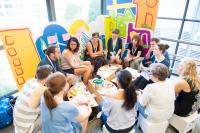In Europe, Turin is one of the cities investing in developing new methods to manage ‘the commons’, for instance through the enforcement of a regulation on common goods (Regolamento Beni Comuni Urbani - approved just one year ago, and to implement social innovation, through the Torino Social Innovation Initiative (TSI), which objective is to encourage and sustain new collaborative forms of dialogue with civil society related to the management of public good/services and provision of collective public services. The TSI initiative is a multi-year programme, proposing an open platform to support bottom-up processes of urban/social innovation.
Turin’s commitment to innovation in urban practices methods and exchange at the European level translate into a long term involvement and commitment in European projects on issues related to urban planning. It started with the URBAN Programme and is now represented by its implication in two of the leading European Programmes on urban planning: URBACT and
Urban Innovative Action.
For Turin: URBACT and UIA: strong thematic and methodological links
Common goods, co-creation, social innovation are at the core of the projects Turin is involved in in the two European urban programmes. When looking in detail at
Boostinno (URBACT) and CO-CITY (UIA) in particular, the thematic links between the two programmes and project appear clearly. Methodological links also clearly appear between the two programmes and the several projects Turin is and has been involved in.
Turin & URBACT: a long lasting commitment to co-creation and social innovation
Turin has long been involved with URBACT: through the (now closed) projects
Urbact Markets and
My Generation at Work, which was about what cities, with their partners, can do to promote the employability and employment of young people. My Generation at Work was using and developing innovative methods to foster young people’s employability and the work of Turin on Social Innovation developed and deepened in this context.
Fabrizio himself has been involved directly in the My Generation at Work five years ago, at a time in which the City of Turin was committed to design a new policy to promote youth unemployment and social innovation.
“In my opinion the partnership was really good”. Fabrizio was extremely pleased by the partnership, which led the City of Turin to want to be involved in further URBACT projects, like
Boostinno.
The current URBACT project
Boostinno builds on the work done and expertise gained inside Generation at Work. Within this project Turin is committed to redesign Torino Social Innovation. Its focus is to enable new generation of innovative entrepreneurs to produce positive territorial impact in urban deprived areas. The City of Turin is expecting to receive funding from the national government for this.
--------------------------------------------------------------------------------------------------------------------------------------------
BOOSTINNO
Boostinno is focussed on enabling public administrations to play a new role as public booster and brokers/facilitators of social innovation activities/projects/policies, by driving social innovation in, through and out the public sector. It is a project led by the City of Gdańsk (Poland), involving Wroclaw (Poland), Baia Mare (Romania), Milan (Italy), Turin (Italy), Barcelona (Spain), Braga (Portugal), Paris (France), Strasbourg (France) and Länsstyrelsen Skane (Sweden). --------------------------------------------------------------------------------------------------------------------------------------------
Turin is also involved URB-INCLUSION on urban inclusion, led by Barcelona, one of the new
URBACT Implementation Networks that deal more specifically with the
challenges of implementation. In this project the City of Turin is more focussed on the topic of civic participation in order to set up new social innovation models to deliver new services for the local residents. For this project Turin has already the resources to implement the project as part of article 7 ERDF funding.
Turin & Urban Innovative Action: A Pioneering project of social innovation to combat social poverty
Turin was chosen among 378 European Cities to test further an Urban Innovative Action in the field of the commons and social innovation.
Its project CO-CITY focusses on the collaborative management of urban commons to counteract poverty and social polarisation. With this project Turin wants to involve the local residents to co-design and co-manage the public services.
-------------------------------------------------------------------------------------------------------------------------------------------
CO-CITY
-----------------------------------------------------------------------------------------------------------------------------------------------
“Co-City is an extraordinary occasion to support new forms of active participation of the citizens towards the regeneration of the City. I hope that new enterprises will be created around this new model of relation between public and private sector, generating new employment opportunities and jobs in Turin”
What links between URBACT and UIA for Turin?
We were curious to understand what other links than thematic existed between the two European urban policy programmes Turin is currently involved in.
Is there a possible trajectory between the two programmes? Did the experience in URBACT helps Turin in proposing an Innovative Idea? Are there other similarities?
URBACT Improved Turin’s capacity to develop innovative solutions and participative methods
Involvement in a community of practitioners in Europe
Through learning from other European cities and setting-up long standing relationships, URBACT helped Turin develop, test, discuss new urban programmes at the local level. The relationship with some cities, such as Rotterdam or Barcelona, has developed into one in which before launching a new local urban programme or policy, the city can contact the other cities, ask advice, comparison points and therefore improve plans for new local programmes.
Being involved in a European project helps reaching out more broadly within the city and convincing more local actors to test and implement new methods.
Being part of a European Community of Practice, of a network of cities and a permanent platform of exchange, which provides peer learning and motivation, is something very valuable, according to Fabrizio. It also helps to understand better how to develop solutions to the urban challenges of our times.
The URBACT Method: a powerful tool to design Innovation
Fabrizio insists that the experience in URBACT has helped the city to set up a successful Urban Innovative Action bid. Since their language, methodologies, and framework are quite similar, defining innovation in the urban context has become clearer and more effective. The learnings from the URBACT Method have definitely been a key element in defining and proposing a successful project for UIA.
Video: The URBACT Method video
URBACT helped a lot in highlighting the importance of the setting-up and management of a URBACT Local Group composed of various stakeholders to design new innovative projects or for instance to redesign public services.
Proposing a participative method and a new form of relationship between the municipality and citizens is also for instance at the core of Turin’s UIA CO-CITY. Within this project, the definition and implementation of several pacts of collaboration is expected to improve the participation of residents in different parts of the city and to foster the commitment of the citizens towards a more inclusive and cohesive city.
There is definitely a similarity of the methods proposed and a learning path for the city between URBACT and UIA. With CO-CITY, Turin will systematise and experiment at a larger scale, the URBACT local group aproach it has developed within its previous URBACT projects.
In reality several UIA assessment criteri, for instance the quality of the local partnership and the capacity to co-design solution, the attention to measurability correspond to key dimensions of the URBACT method.
In terms of capacity building, Fabrizio’s colleagues, who took part to the
URBACT Summer University, were very eager and happy to learn new methodologies to think about urban policies and involve the local residents in local policy design. Indeed, such trainings for civil servants do not exist at local and national level.
Urban Innovative Action: Strong support to develop a pioneering local project
Citizens’ participation, co-creation, social innovation, all methods that have been developped locally in Turin also with the support of URBACT are central in CO-CITY, but at the opposite of URBACT, UIA is not focussed on exchanging ideas with other European cities, but on testing innovative and effective urban experimentations pioneering new solutions for cities. Local results are the most important output expected of the CO-CITY project.
Urban Innovative Actions is supporting its successful cities in various ways. For instance, by introducing different degrees of flexibility - in the selection of local partners, in the reduced administrative burden, in the emphasis given to measurement and monitoring, and even more importantly asking urban authorities to take a risks and therefore accepting potential failures - it aims at contributing to create urban laboratories in each city to test innovative ideas on a real urban scale, unlocking the great potential for bold innovation in cities. Fabrizio highlights how important UIA is at the local level since it brings the resources to develop a strong local partnership and innovation, a characteristic which is very valued by local political representatives.
In addition to support the most innovative urban projects in Europe, UIA also aims to capture the knowledge generated by UIA projects and to make it available to a wider audience of urban policy-makers and practitioners in Europe. On this strand of activities of UIA the potential complementarities and synergies with URBACT are evident.
Conclusion
URBACT and UIA appear to complement each other fruitfully, URBACT is as a platform to nurture, develop and exchange new ideas, solutions and practices at the European level and to implement those ideas locally. UIA provides tools and financial support to pioneer new ideas locally at a larger scale, which will make them transferable to other cities. There are plenty of innovative and ineteresting ideas and practices implemented in cities around Europe. Ensuring an effective transfer (meaning local adaptation and reuse) is one of the key objectives and aims of URBACT, through the
Good Practice Call currently ongoing the new Transfer Networks, to be launched in the autumn.
Want to read more?
On the commons:
On Turin and Social Innovation:








